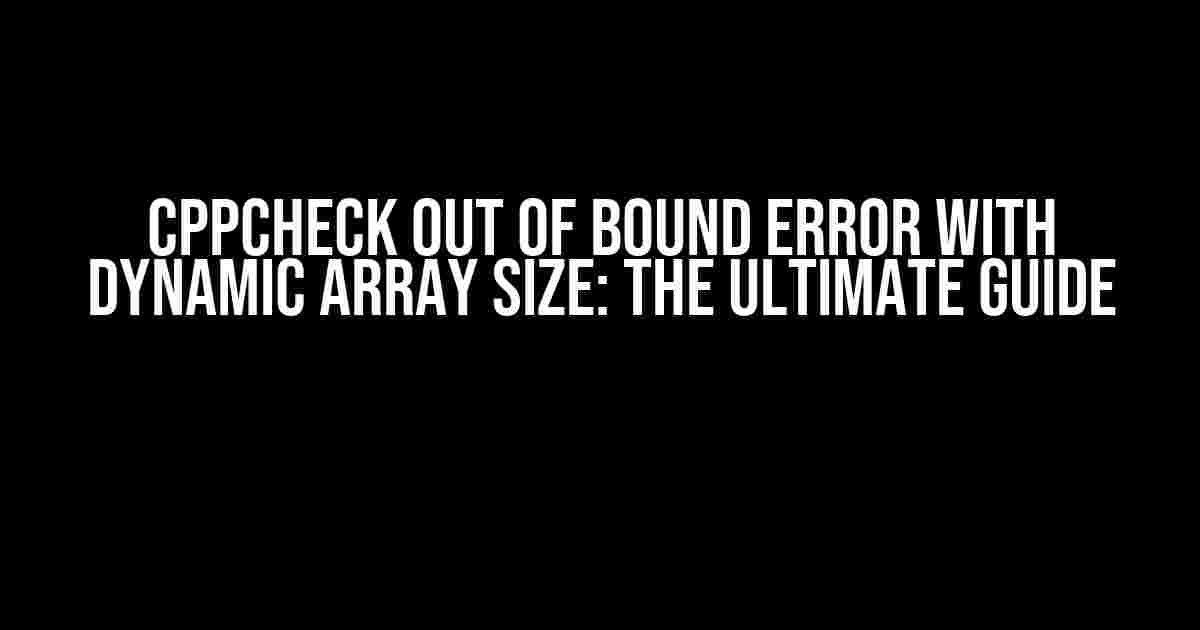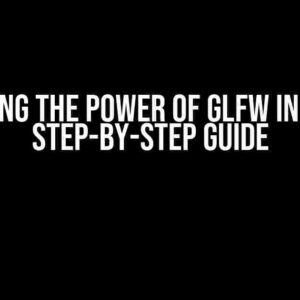Are you tired of seeing the dreaded “out of bounds” error message when working with dynamic arrays in C++? Well, fear not, my friend, because today we’re going to tackle this issue head-on and provide you with a comprehensive guide on how to avoid these pesky errors using cppcheck.
What is cppcheck?
Cppcheck is a free, open-source static analysis tool designed to detect bugs and warnings in C/C++ code. It’s a command-line tool that can be integrated into your development workflow to identify potential issues before they become major problems. One of the most common issues cppcheck can help with is the “out of bounds” error when working with dynamic arrays.
What causes out of bound errors?
Out of bound errors occur when you try to access an array element that is outside the bounds of the array. This can happen in several ways:
- Array indexing: When you access an array element using an index that is greater than or equal to the array size.
- Pointer arithmetic: When you perform pointer arithmetic on an array, causing the pointer to point outside the bounds of the array.
- Dynamic array sizing: When you dynamically allocate an array with a size that is too small, causing out of bounds errors when accessing elements.
Detecting out of bound errors with cppcheck
Cppcheck can detect out of bound errors in several ways:
- Array indexing: Cppcheck can detect when you’re accessing an array element using an index that is out of bounds.
- Pointer arithmetic: Cppcheck can detect when you’re performing pointer arithmetic that may cause the pointer to point outside the bounds of the array.
- Dynamic array sizing: Cppcheck can detect when you’re dynamically allocating an array with a size that is too small.
Let’s take a look at an example of how cppcheck can detect an out of bound error:
int main() {
int* arr = new int[5];
arr[10] = 10; // cppcheck will detect this as an out of bounds error
return 0;
}
In this example, cppcheck will detect that we’re trying to access the 11th element of an array that only has 5 elements, resulting in an out of bounds error.
How to fix out of bound errors with cppcheck
Now that we know how cppcheck can detect out of bound errors, let’s take a look at how we can fix them:
Array indexing
To fix out of bound errors caused by array indexing, make sure to check the array bounds before accessing elements:
int main() {
int arr[5];
int index = 10;
if (index < 5) {
arr[index] = 10; // this is okay
} else {
std::cerr << "Error: Index out of bounds" << std::endl;
}
return 0;
}
In this example, we're checking if the index is within the bounds of the array before accessing the element. If the index is out of bounds, we're printing an error message.
Pointer arithmetic
To fix out of bound errors caused by pointer arithmetic, make sure to check the pointer values before performing arithmetic:
int main() {
int* arr = new int[5];
int* ptr = arr + 10; // cppcheck will detect this as a potential out of bounds error
if (ptr < arr || ptr >= arr + 5) {
std::cerr << "Error: Pointer out of bounds" << std::endl;
} else {
*ptr = 10; // this is okay
}
return 0;
}
In this example, we're checking if the pointer value is within the bounds of the array before performing arithmetic. If the pointer is out of bounds, we're printing an error message.
Dynamic array sizing
To fix out of bound errors caused by dynamic array sizing, make sure to allocate enough memory for the array:
int main() {
int size = 10;
int* arr = new int[size];
arr[20] = 10; // cppcheck will detect this as an out of bounds error
return 0;
}
In this example, we're allocating an array with a size of 10, but trying to access the 21st element. To fix this, we need to allocate enough memory for the array:
int main() {
int size = 20;
int* arr = new int[size];
arr[20] = 10; // this is okay
return 0;
}
In this example, we're allocating an array with a size of 20, which is enough to access the 21st element.
Best practices for avoiding out of bound errors
To avoid out of bound errors altogether, follow these best practices:
- Always check array bounds before accessing elements.
- Avoid using magic numbers when allocating arrays.
- Use containers like std::vector instead of dynamic arrays.
- Use cppcheck regularly to detect potential out of bound errors.
| Best Practice | Description |
|---|---|
| Check array bounds | Always check the array bounds before accessing elements to avoid out of bound errors. |
| Avoid magic numbers | Avoid using magic numbers when allocating arrays, instead use constants or calculated values. |
| Use std::vector | Use std::vector instead of dynamic arrays to avoid out of bound errors and memory leaks. |
| Use cppcheck | Use cppcheck regularly to detect potential out of bound errors and other issues in your code. |
Conclusion
In conclusion, out of bound errors can be a major pain when working with dynamic arrays in C++. However, by using cppcheck and following best practices, you can avoid these errors and write more robust and reliable code. Remember to always check array bounds, avoid magic numbers, use std::vector, and use cppcheck regularly to detect potential out of bound errors.
By following these guidelines, you'll be well on your way to writing C++ code that is free from out of bound errors and other common mistakes. Happy coding!
Frequently Asked Question
Get answers to the most common questions about cppcheck out of bound error with dynamic array size!
What is an out-of-bounds error in C++?
An out-of-bounds error occurs when you try to access an element in an array that is outside the range of valid indices. In C++, arrays are 0-indexed, meaning the first element is at index 0, and the last element is at index `size - 1`. If you try to access an element at an index that is less than 0 or greater than or equal to `size`, you'll get an out-of-bounds error. Cppcheck can help detect these errors, especially when working with dynamic array sizes!
How does cppcheck detect out-of-bounds errors with dynamic array sizes?
Cppcheck uses static analysis to detect out-of-bounds errors. It analyzes the source code and checks if there are any instances where an array is accessed with an index that may be out of bounds. When working with dynamic array sizes, cppcheck takes into account the size of the array and checks if the index used is within the valid range. It can also detect errors when the array size is changed dynamically during runtime!
Can cppcheck detect out-of-bounds errors with pointers?
Yes, cppcheck can detect out-of-bounds errors with pointers. When you use pointers to access elements of an array, cppcheck analyzes the pointer arithmetic and checks if the resulting index is within the valid range of the array. This is especially useful when working with dynamic memory allocation and pointers. Cppcheck can help you catch those pesky out-of-bounds errors that can lead to segmentation faults!
How can I fix an out-of-bounds error detected by cppcheck?
To fix an out-of-bounds error detected by cppcheck, you need to ensure that the index used to access the array is within the valid range. Check your code and make sure you're not accessing the array with an index that may be out of bounds. You can also use cppcheck's suggestions to fix the error, such as using bounds checking or modifying the index calculation. Remember, preventing out-of-bounds errors is key to writing robust and secure C++ code!
Can I configure cppcheck to ignore certain out-of-bounds errors?
Yes, you can configure cppcheck to ignore certain out-of-bounds errors. Cppcheck provides a wide range of configuration options that allow you to customize its behavior. You can use command-line options or configuration files to suppress specific errors or warnings. However, be careful when ignoring errors, as they can still lead to undefined behavior in your code. Use your best judgment and only ignore errors that you're certain are false positives!



